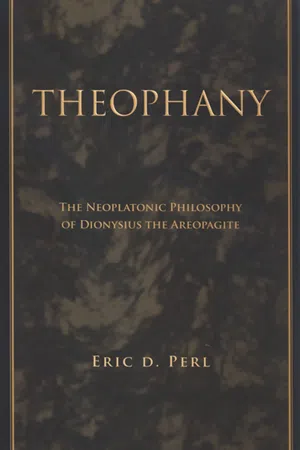
- 175 pages
- English
- PDF
- Available on iOS & Android
About this book
Situates Pseudo-Dionysius the Areopagite as a Neoplatonic philosopher in the tradition of Plotinus and Proclus.
The work of Pseudo-Dionysius the Areopagite stands at a cusp in the history of thought: it is at once Hellenic and Christian, classical and medieval, philosophical and theological. Unlike the predominantly theological or text-historical studies which constitute much of the scholarly literature on Dionysius, Theophany is completely philosophical in nature, placing Dionysius within the tradition of ancient Greek philosophy and emphasizing, in a positive light, his continuity with the non-Christian Neoplatonism of Plotinus and Proclus. Eric D. Perl offers clear expositions of the reasoning that underlies Neoplatonic philosophy and explains the argumentation that leads to and supports Neoplatonic doctrines. He includes extensive accounts of fundamental ideas in Plotinus and Proclus, as well as Dionysius himself, and provides an excellent philosophical defense of Neoplatonism in general.
Frequently asked questions
- Essential is ideal for learners and professionals who enjoy exploring a wide range of subjects. Access the Essential Library with 800,000+ trusted titles and best-sellers across business, personal growth, and the humanities. Includes unlimited reading time and Standard Read Aloud voice.
- Complete: Perfect for advanced learners and researchers needing full, unrestricted access. Unlock 1.4M+ books across hundreds of subjects, including academic and specialized titles. The Complete Plan also includes advanced features like Premium Read Aloud and Research Assistant.
Please note we cannot support devices running on iOS 13 and Android 7 or earlier. Learn more about using the app.
Information
Table of contents
- THEOPHANY
- CONTENTS
- ACKNOWLEDGMENTS
- NOTE ON TRANSLATIONS
- ABBREVIATIONS
- INTRODUCTION
- 1. BEYOND BEING AND INTELLIGIBILITY
- 2. BEING AS THEOPHANY
- 3. GOODNESS, BEAUTY, AND LOVE
- 4. THE PROBLEM OF EVIL
- 5. THE HIERARCHY OF BEING
- 6. THE CONTINUUM OF COGNITION
- 7. SYMBOLISM
- CONCLUSION
- NOTES
- BIBLIOGRAPHY
- INDEX